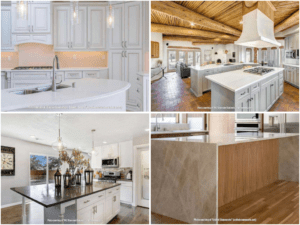How to Increase Countertop Sales Without Additional Costs: The Role of Friendliness and Engagement in Client Communication
Intro
When choosing a contractor, the first impression often plays a crucial role. Clients frequently make their decisions within the first few seconds of interacting with you or your manager. Why are politeness, openness, and friendliness during a phone call so essential? Because communication influences trust, the perception of your company, and ultimately, the likelihood of closing a deal.
In this article, we share insights from our "Mystery Shopper" method. Our goal is not only to evaluate the quality of services provided by companies but also to help them enhance their customer service. You’ll find real-life examples, conclusions, and tips in this article, plus a small spoiler: we've prepared a bonus for our readers—something valuable for those who want to improve their client communication and become even more welcoming.
Get comfortable, and let’s get started!
Part 1: Issues in Client Communication
Insights from the Mystery Shopper Experience
As mentioned, we use the Mystery Shopper method. This important role is carried out by Maya and Valerie. Maya, our lead mystery shopper, has extensive professional and life experience. She spent years working in customer support, including for Apple, where the standards for employees are incredibly high. Maya’s skills and expertise have become invaluable to Countertop Contractors.
Using her professionalism, Maya evaluates companies through phone calls, correspondence, and other parameters. Today, we will focus on one specific criterion: friendliness. We’ll share real-world experiences of our team and how challenging it can be to engage with certain businesses.
Maya’s persona is simple: she and her husband are moving into a new home and are looking to install a new kitchen countertop. She calls various companies to compare prices for two materials—Calacatta Idilio and Carrara Moro.
We have 10 criteria for evaluating companies, including staff friendliness, expertise, years in business, manufacturing facilities, veteran discounts, deposit amounts, quotation preparation times, price ranges, and production timelines. Today, we’re focusing solely on friendliness, which is rated on a scale from 1 to 5.
Friendliness Rating Scale:
- Poor (1 point): Communication was cold, without an initial introduction. The conversation was limited to answering questions.
- Satisfactory (2 points): The conversation was dry and uninterested. The representative introduced themselves but didn’t ask for the client’s name.
- Good (3 points): The representative asked for the client’s name and introduced themselves. They were polite, but there was no warm atmosphere or genuine interest.
- Very Good (4 points): Communication was warm. The consultant introduced themselves, mentioned their company name, showed interest, and created a friendly and respectful atmosphere.
- Excellent (5 points): The representative introduced themselves, asked for the client’s name, and showed maximum enthusiasm. They were polite, cheerful, and genuinely interested in the client’s needs.
We’ve contacted thousands of companies, and each one showcased different levels of politeness—from exceptionally welcoming to unacceptably rude. While each company has its own communication style, wouldn’t we all prefer to speak with friendly and kind voices on the other end of the line?
“Companies that pay attention to their clients, show genuine interest in their needs, and are ready to help consistently receive high scores. For example, representatives who provided detailed information about materials, explained the differences between quartz and granite countertops, and discussed popular designs earned trust and favor,” Maya explains.
Part 2: Common Mistakes Companies Make in Client Communication
During her work, Maya encountered various approaches to communication. She notes, “I often came across managers or business owners who didn’t introduce themselves. Conversations were cold, formal, and lacked interest. Sometimes, people were suspicious of calls from out-of-state numbers, which created distrust. Some companies even refused to work with clients they didn’t find ‘promising.’”
Common Mistakes We Encountered:
- No initial introduction: Representatives failed to introduce themselves or ask for the client’s name.
- Cold tone or lack of warmth: Conversations felt distant and uninviting.
- Formal, disengaged communication: Representatives showed little interest in the client’s needs.
- Distrust of out-of-state calls: Many clients purchase homes in different states before moving, so this suspicion can be off-putting.
- Refusal to work with “non-promising” clients: Judging a potential client based on a single call is unprofessional. Every client matters. Even if they don’t make a purchase, leaving a positive impression could lead to referrals.
Maya also observed, “At the beginning of our project, about half of the calls ended with a refusal to send a quote. However, we learned that the situation could change by immediately explaining the purpose of the call, alleviating suspicion, and showing genuine interest in the conversation.”
Part 3: Regional Differences, Real Cases, and Tips
We’ve noticed significant regional differences in how company representatives communicate:
- Businesses in Southern states like Georgia, Oklahoma, Alabama, and Florida were generally friendlier.
- In Texas, representatives were often cautious, requiring more time to build trust.
- Surprisingly, smaller towns exhibited less engagement. We had initially assumed smaller businesses would be more personal, but it seems many already have a loyal customer base and feel less pressure to compete.

Viviana from Countertop Designs demonstrates friendly and professional communication. She is competent, provides clear answers to questions, but remains formal. Her demeanor is an example of high-quality yet neutral customer service, focusing primarily on delivering information upon request.
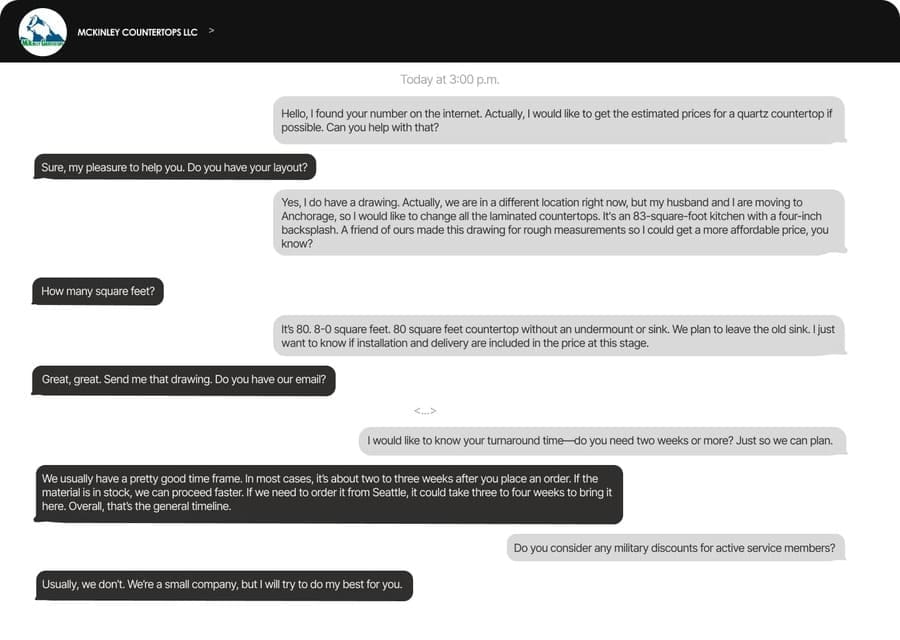
Anna from McKinley Countertops LLC demonstrates excellent customer service. Her communication style, friendliness, and willingness to accommodate leave an exceptionally positive impression. She skillfully combines professionalism with a personalized approach, making her interactions both pleasant and effective for the customer.
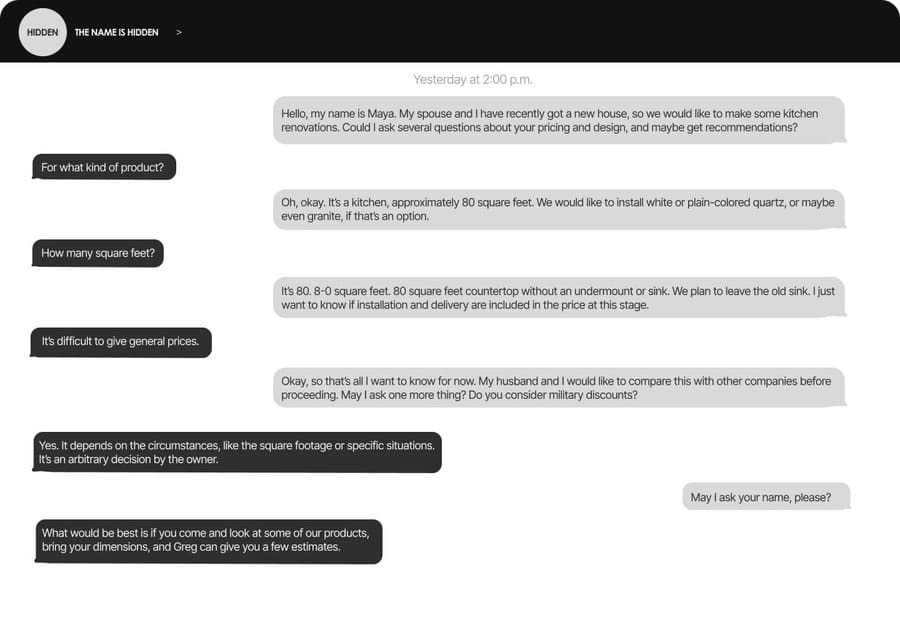
The company representative showed minimal engagement, did not introduce themselves, gave vague answers, and failed to demonstrate care and attention toward the customer. Such communication can deter potential customers and leave a negative impression of the company.
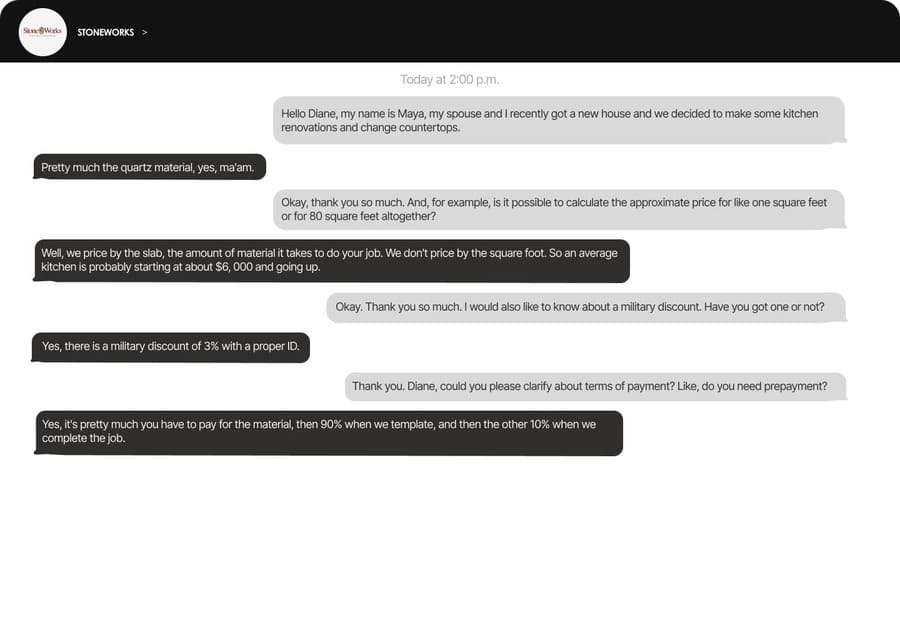
Diane from StoneWorks demonstrated competence and provided all the necessary information. The communication was friendly and informative, but it slightly lacked a personal touch and enthusiasm that could have created a warmer atmosphere.

This dialogue demonstrates extremely rude, disrespectful, and unprofessional behavior by the employee. The case underscores the critical need for training employees in professional and respectful communication. Unacceptable behavior by a representative not only erodes customer trust but also jeopardizes the company’s reputation. Clients choose companies that show respect, interest, and a genuine willingness to assist.
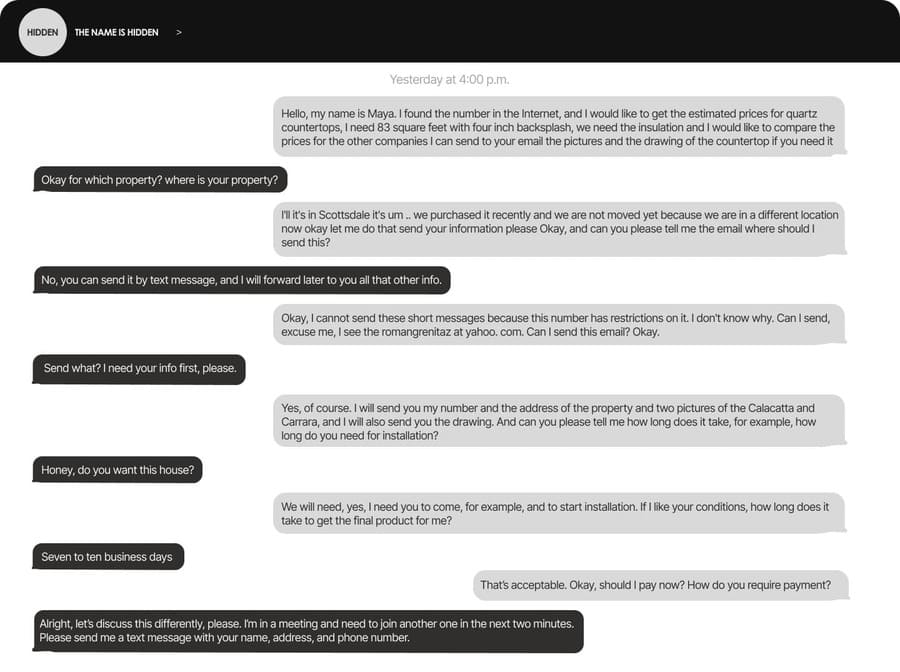
This case highlights the importance of a careful and professional approach to customer interactions. Engaging with clients goes beyond simply answering their questions; it is key to building loyalty and trust. Companies should invest in training their employees in the fundamentals of professional communication to minimize such incidents and strengthen their position in a competitive market.
You’ve just read a portion of the dialogues, and you’ll likely agree with us that in some cases, it’s fortunate that Maya doesn’t actually need a new countertop at the moment. At least now she knows which contractors to avoid.
The full results of our research will be available in the updated version of our website, as part of each company’s profile. Our primary goal is to feature only those companies that meet industry and sales standards, allowing clients to make informed choices without wasting time or encountering unreliable businesses.
Recommendations for Companies Facing Issues with Business Communication
If a company receives low scores on the “Friendliness” criterion in 2024 due to poorly designed scripts or poorly chosen words by employees, we believe this should serve as a signal to reevaluate and improve business practices. By addressing these shortcomings, companies could achieve much higher ratings in 2025, climb the rankings, and even secure a spot in the Top 500 Best Countertop Manufacturing and Installation Companies in the U.S.!
Friendliness is just the first step in building a connection with potential clients, and it can be crucial for retaining customers. From our experience, conversations with business owners themselves have often been the best. On the other hand, when employees failed to answer questions or provide helpful responses, it negatively impacted the company’s image. To prevent this, sales experts recommend establishing a regular training schedule for staff. This could include courses or workshops on improving communication skills and professional correspondence.
It’s critical to help employees understand that they represent the “face” of the company. They are often the first point of contact for potential customers, and their behavior shapes the first impression. This interaction can determine whether a client continues the conversation or not. Employees must be polite, avoid making personal remarks, follow up when needed, and always respond to emails promptly.
If you’re a business owner, try calling your company from an unfamiliar number and pretend to inquire about a countertop. If your employee handles the call professionally, it’s a good indication that everything is running smoothly. However, if the conversation makes you feel frustrated, or even angry enough to intervene with management, it’s likely time to address the issues with your staff—or take more drastic measures, such as letting problematic employees go and hiring new ones.
Bonus for Our Followers
We believe that employee friendliness is a strategic tool that can significantly boost sales. To help you implement this approach in your company, we’ve prepared an exclusive guide with practical tips and real-life examples.
How to Get It?
- Follow us on Instagram.
- Leave a comment with the text "Waiting for the guide".
We’ll verify your subscription and send you a PDF file packed with recommendations to improve your customer communication and elevate your service to the next level!
Conclusion
Employee friendliness isn’t just about politeness; it’s a crucial factor that impacts business success. Companies that prioritize employee training and focus on improving communication quality gain a competitive edge, experience faster growth, and build stronger relationships with their clients.
Our experience has shown that even small adjustments in your approach can lead to a significant increase in sales. Remember, first impressions matter a lot. Check your rating in our rankings and take the lead in your industry!








